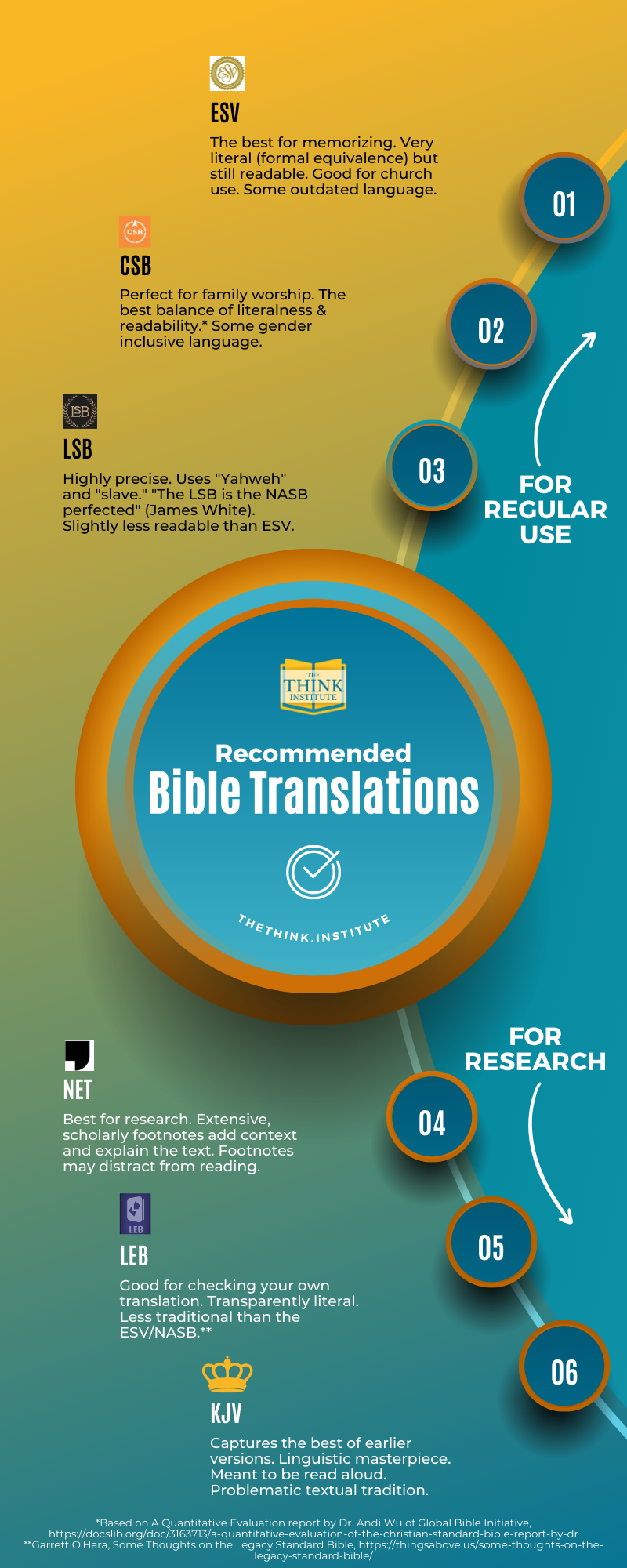Recommended Bible Translations (The Think Institute Guide)
Are you wondering which version of the Bible you should use? Here is a handy guide to our top recommended translations of the Bible.
The Best Translations of the Bible for Regular Use
Regarding regular use, we are thinking in terms of personal devotions, family worship, small group studies, and corporate congregational worship. For this, you need a blend of accuracy and clarity. It should be easy to understand and should lend itself well to being read aloud (as in corporate readings at church). The top three Bible versions we recommend for regular use are:
English Standard Version (ESV): This is the best for memorizing. It is very literal (formal equivalence) but still readable. It’s good for church use, but it does have some outdated language.
Christian Standard Bible (CSB): The CSB is perfect for family worship, with children of all ages. It has the best balance of literalness & readability.* It is excellent for immersive reading. One word of caution: it does use some gender inclusive language, which is less accurate and which some users might find problematic.
Legacy Standard Bible (LSB): The Master’s Seminary update of the NASB is highly precise. It does not shy away from using terms like "Yahweh" and "slave." James White (Alpha & Omega Ministries) says that, "The LSB is the NASB perfected." It may be slightly less readable than ESV.
The Best Translations of the Bible to Use for Research
When it comes to research, you need a Bible you can use for deep personal study, public teaching prep, and doing a deep dive into difficult passages. Readability is less important here; you want to know what the original text is saying. What were the words the original authors used, and what did those words mean in their historical context? The top three Bible versions we recommend for this kind of research are:
New English Translation (NET): The NET is the best for research, simply because of its unparalleled, extensive, scholarly footnotes, which add valuable context and explain the text. However, for those easily distracted, the footnotes may deter from immersive reading.
Lexham English Bible (LEB): If you prepare your sermons or teachings from the original languages, the LEB is a solid choice for checking your own translation. Transparently literal, it tells you exactly what the original authors wrote. For this reason it comes off as more clunky. It is also less traditional in its terminology than the ESV/NASB.**
King James Version (KJV): The KJV captured the best of earlier versions like the Tyndale and Geneva Bibles. It is a time-tested, linguistic masterpiece and serves as a time machine into past centuries of the English-speaking church. It was written to be read aloud. User beware: the KJV was based on a sub-par textual tradition and has a few major translation errors.
Want to learn more about how to choose the best Bible translation for you?
Listen to this episode now.
Drew Von Nieda joined us on The Worldview Legacy Podcast for a deep dive into translation styles, textual traditions, and how to choose the right Bible for you and your family. This episode will help you build a legacy in the Christian worldview for your family and the younger generation.
In this episode you will learn:
• The difference between formal equivalency, dynamic equivalency, and optimal equivalency.
• The problem with gender inclusive language in some Bible translations.
• About eight different translations: the KJV, NASB, LSB, CSB, ICB, ESV, NET and NIV, as well as the MacArthur Study Bible and the Geneva Bible.
• The distinction between Bibles based on the Eclectic Text tradition vs. the Textus Receptus—and which ones better.
• How to get started with studying Greek so you can make your own translations.
• Why unless you’re in full-time ministry you don’t need to buy a bunch of different Bible translations, but you do need a good commentary.
Listen or watch now!
Find it on…
——
*Based on A Quantitative Evaluation report by Dr. Andi Wu of Global Bible Initiative, https://docslib.org/doc/3163713/a-quantitative-evaluation-of-the-christian-standard-bible-report-by-dr
**Garrett O'Hara, Some Thoughts on the Legacy Standard Bible, https://thingsabove.us/some-thoughts-on-the-legacy-standard-bible/


